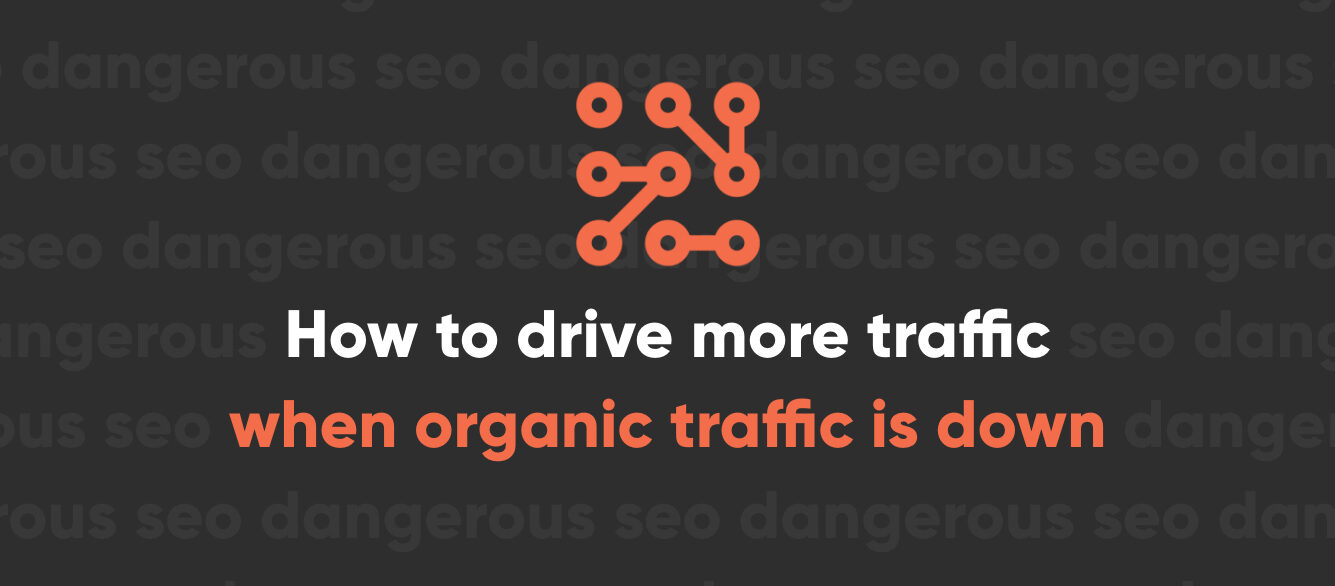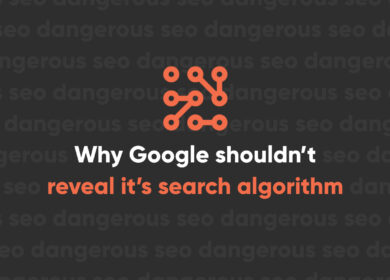
How you can drive more Google traffic when Google organic traffic is down

The numbers are in. Google organic traffic is down. Sound the alarms! We’re all doomed.
Or maybe not. Stay tuned for more about that. First, let’s get into the details behind this decrease in Google organic.
According to the latest Merkle digital marketing report, year-over-year visits from Google organic are down by 8%. And that’s not a result of Google losing market share. In fact, Google’s market share actually went up, which means pretty much all organic traffic is down—except for Duck Duck Go, but I highly doubt that’s where you’re getting much of your business.
So what exactly does this drop in organic traffic mean for you? Well, it means you might be getting fewer organic visitors to your website. If that is the case, then I promise you it’s not Google’s fault. At least not entirely.
SEO doomsday is nowhere near nigh
If you spend any time on the Google Webmaster forums or the comment section of any SEO news site, you’re bound to see plenty of “sky is falling” type of proclamations. Here are the most common ones:
- Google is stealing all of our organic traffic.
- Google is forcing us to spend more money on ads.
- Google is sending us fake traffic.
- Google is driving us all out of business.
Additionally, any time there is a Google algorithm update, somehow EVERYONE is losing all their traffic and the only sites that are supposedly ranking well are Amazon, Wikipedia, or that blackhat garbage site with thin content and billions of toxic backlinks.
Fortunately, none of the above is true. Let’s review each of these points one-by-one.
- Yes, Google is serving more answers and more content directly in the search results. That doesn’t mean Google is stealing all your traffic (unless you’re a lyrics website). Need proof? Google organic may be down 8% year-over-year, but our clients on average have seen a 10% increase in year-over-year organic traffic.
- Yes, Google does want us to spend money on ads—and you should be. Google Ads can be very profitable if you set up and manage your campaigns properly. Heck, we manage Google Ads accounts with 50:1 return on ad spend. Just find the right Google Partner to handle your ads. Ads aren’t bad, and Google isn’t evil for selling them.
- Yes, Google is sending you lots of traffic that doesn’t result in leads or sales. That doesn’t mean it’s fake. The vast majority of people who come to your website won’t become your customers. Even Amazon.com only has a 13% conversion rate for non-Prime visitors.
- If Google is driving you out of business, then you have a terrible business model.
And as far as those Google algorithm updates knocking every website back in the rankings: someone has to rank at the top. If it’s not your website, then you need to do better.
So what can you do to drive more Google traffic?
If your year-over-year organic traffic is down, then there are a few possible explanations outside of Google conspiracy theories:
- Interest in your products or services has gone down
- You have increased competition or new players in the market
- Your competitors have improved their SEO and are outperforming you
- You’ve done something wrong on your website which has hurt your rankings
If the issue is #1, then you need to increase interest in your products or services. That probably means you have to advertise and do some PR. Alternatively, you can expand your products or services, but that’s a business decision and not a digital marketing decision.
If your issue is related to #2 or #3, then you need to improve your SEO—and probably supplement with more aggressive advertising campaigns. More on this in a moment.
If your issue is #4, then you need to figure out what you’ve done wrong and fix it. When decreased traffic is the result of decreased rankings, there are literally dozens of things that could be the culprit. The big things are typically:
- Manual actions taken by Google (check Google Search Console)
- Your site was accidentally noindexed (do a site: search on Google)
- You have a technical SEO problem
- Your content is stale and no longer as relevant as your competition
To properly diagnose which issue is causing your drop in rankings, you’ll need to bring in an SEO professional.
Now, let’s go back to #2 and #3. In these scenarios, the drop in traffic is not really your fault. Nor is it Google’s fault. Fortunately, it’s generally pretty easy to fix. Of course, by easy I don’t mean it’s simple or fast. I mean there is an easy solution: create a lot of great content.
This concept isn’t rocket science. If you want to drive more Google organic traffic, then build more content that’s highly relevant to what people are searching for on Google. Most of the time, you shouldn’t try to do this yourself. You should enlist an agency that has both SEO and content creation capabilities. This gives you the best of both worlds under one roof. As a result, your year-over-year organic traffic can look like this even when Google is down:

How did we accomplish this 354% year-over-year Google organic growth during a period of worldwide declining Google organic traffic? It’s simple. We created a lot of great content that drove more visits and more leads for the client.
If you’re worried about decreasing organic traffic or in need of a solution to drive more business, then Perrill can help. We’re a full-service digital agency committed to helping you grow through the combined power of smart data and killer creative. Contact us today to find out how we can help.

Nate Tower
Nate Tower is the President of Perrill and has over 12 years of marketing and sales experience. During his career in digital marketing, Nate has demonstrated exceptional skills in strategic planning, creative ideation and execution. Nate's academic background includes a B.A. with a double major in English Language and Literature, Secondary Education, and a minor in Creative Writing from Washington University. He further expanded his expertise by completing the MBA Essentials program at Carlson Executive Education, University of Minnesota.
Nate holds multiple certifications from HubSpot and Google including Sales Hub Enterprise Implementation, Google Analytics for Power Users and Google Analytics 4. His unique blend of creative and analytical skills positions him as a leader in both the marketing and creative worlds. This, coupled with his passion for learning and educating, lends him the ability to make the complex accessible and the perplexing clear.



